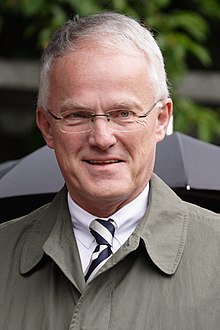Jürgen Rüttgers
| Jürgen Rüttgers | |
|---|---|

Jürgen Rüttgers
|
|
| Minister President of North Rhine-Westphalia | |
|
In office 22 June 2005 – 14 July 2010 |
|
| Preceded by | Peer Steinbrück |
| Succeeded by | Hannelore Kraft |
| Federal Minister of Education, Science, Research, and Technology (Germany) | |
|
In office 17 November 1994 – 14 October 1998 |
|
| President |
Richard von Weizsäcker Roman Herzog |
| Chancellor | Helmut Kohl |
| Preceded by |
Paul Krüger (Science, Research and Technology) Karl-Hans Laermann (Education) |
| Succeeded by |
Edelgard Bulmahn (Education, Science and Research) Werner Müller (Technology) |
| Personal details | |
| Born |
26 June 1951 Cologne, West Germany |
| Nationality | German |
| Political party | CDU |
| Religion | Roman Catholic |
| Website | juergen-ruettgers.de |
Jürgen Rüttgers (born 26 June 1951 in Cologne) is a German politician (CDU) who was the 9th Minister President of North Rhine-Westphalia from 2005 to 2010.
Rüttgers holds degrees in Law and History from the University of Cologne and a Dr. Jur. (Ph.D.) in Law (1979). He became a member of K.D.St. V. Rappoltstein Köln, a Catholic student fraternity that is member of the Cartellverband.
Rüttgers was a Member of the German Bundestag from 1987 until 2000. In 1991 he succeeded Friedrich Bohl as First Secretary of the parliamentary group, in this position assisting the parliamentary group's chairman Wolfgang Schäuble.
Rüttgers served as Federal Minister for Education, Science, Research and Technology in Chancellor Helmut Kohl's fifth cabinet from 1994 to 1998. During his time as minister, he was – together with Luigi Berlinguer (Italy), Claude Allegre (France), and Baroness Tessa Blackstone (United Kingdom) – one of the heads of the "Sorbonne declaration", the joint declaration on harmonisation of the architecture of the European higher education system, on 25 May 1998. That was the starting point of the so-called "Bologna process". He also successfully introduced a law under which online providers can be prosecuted for offering a venue for content illegal in Germany – such as child pornography or Nazi propaganda – if they do so knowingly and it is "technically possible and reasonable" to prevent it. Also, the law made Germany the first country to set rules for so-called digital signatures and give them the status of a legal document.
...
Wikipedia
